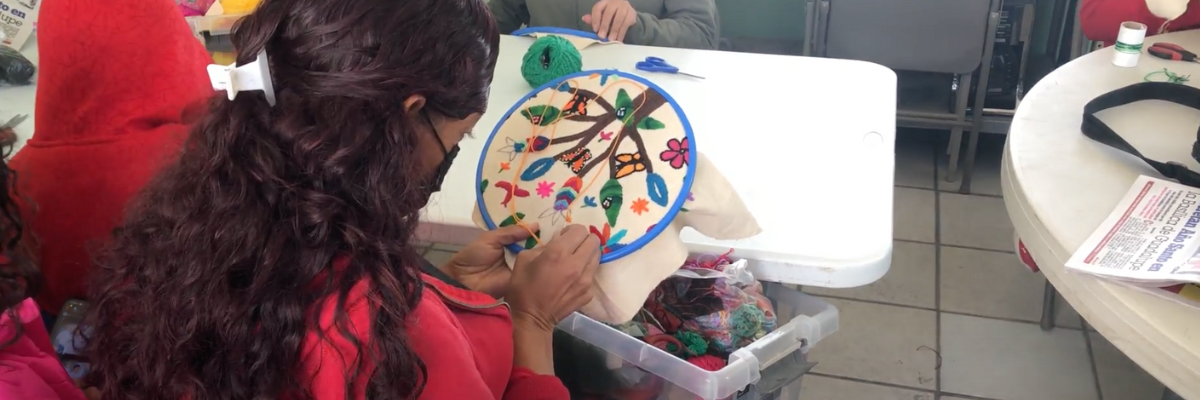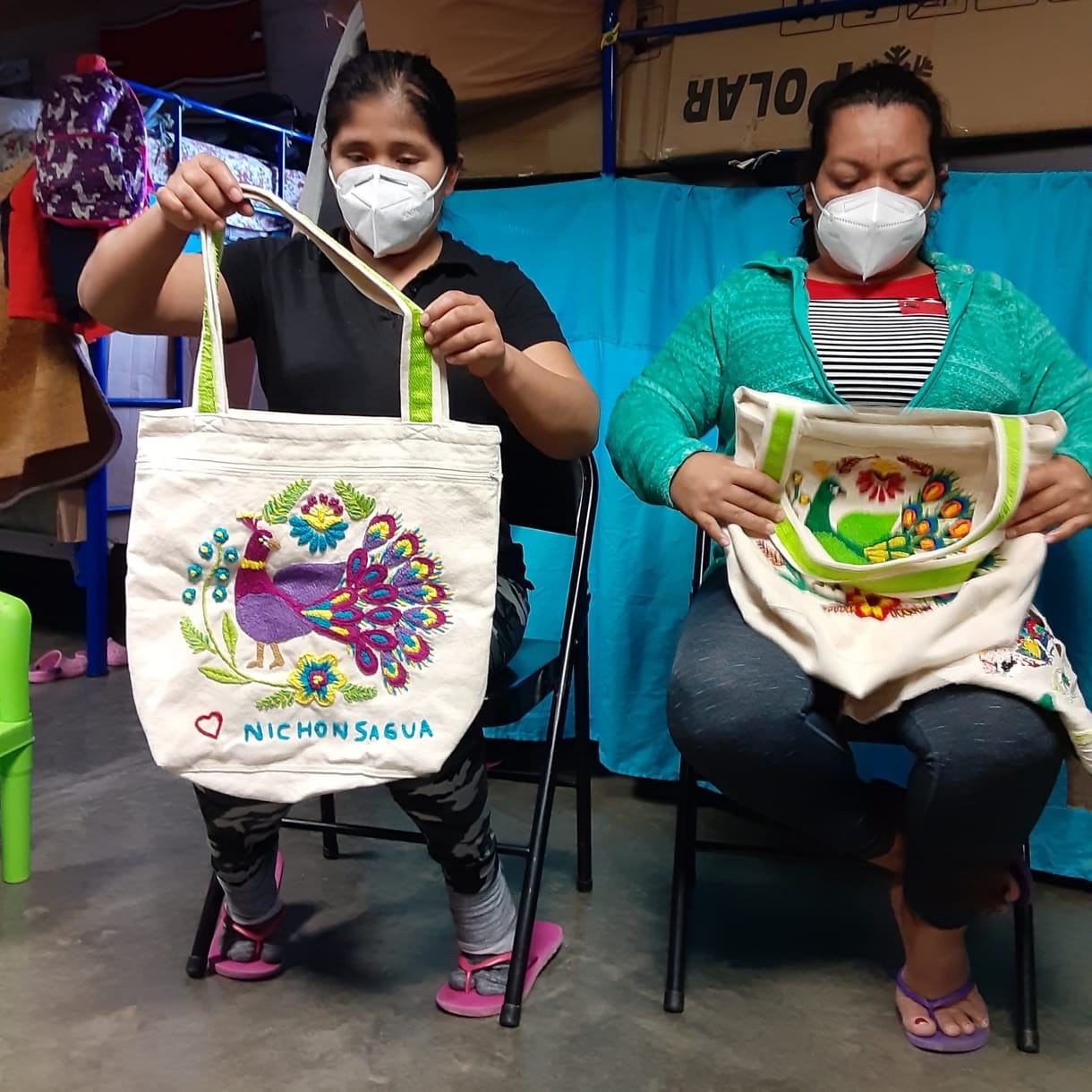
A woman working at the Embroidery Project during a Saturday group-work session
For more than 25 years, the Missionary Society of Saint Columban has worked in one of the most impoverished areas of the US/Mexico border: Rancho Anapra, located on the far western edge of Ciudad Juárez, Chihuahua. Many of its streets remain unpaved, the water is undrinkable, and electricity service is scarce.
Geographically, Anapra’s northern border is Sunland Park, New Mexico, from which it is separated by an 18-foot high, steel barrier. Rather than being an advantage, its proximity to the United States is a burden because it attracts drug traffickers as well as the human traffickers, which has made it a very high-risk area for violence, kidnapping, and the recruitment of young people into these criminal organizations.
In contrast to this violence, for decades, Anapra has been a place of welcome for internal immigration. Mexicans displaced by poverty, natural disasters, and drug violence have migrated to Ciudad Juárez in the hope of a better life. Starting in the 1990s, the North American Free Trade Agreement’s destabilization of the Mexican economy, plus the arrival in Juárez of the maquiladora industry, attracted thousands of people in search of work. Anapra, little by little, became "a bedroom" community for those who were employed in the maquilas.
Corpus Christi, a sanctuary in the desert
One of the few places where Anapra residents can find support and comfort is Corpus Christi Parish, which is administered by the Missionary Society of St. Columban, under the pastoral care of Fr. Bill Morton. People come to Corpus Christi to talk to God about their joys and hopes, their sorrows and anxieties. Here they can enjoy the milestones of life by baptizing their children, receiving the sacraments of first communion and confirmation, and celebrating the joy of their Quinceñeras and weddings. In this poor community, the people know what it means to ask God for "their daily bread."
The parish is also a place of encounter. In September 2018, the first groups of migrants from Cuba and Central America began to arrive in Cd.Juarez, only to be followed by a great wave of people fleeing the violence and poverty generated in their countries by corruption, greed, and the impacts of US policy. They arrived at the border between Mexico and the US, hoping to receive asylum, to reunite with their families who were already in the US, and build their "dream" of a better life.
Instead they ran into a wall.
Over many decades, the US government has been gradually militarizing its southern border to keep migrants out. While the literal wall gets more attention, the government is also building a “policy wall” that makes it dangerous and difficult for migrants and asylum seekers to seek protection in the country.
President Trump implemented several policies that built up this policy wall, aimed at “deterring” migrants from asking for asylum, a legal right they have under international and US law. These policies included metering and family separation, as well as Title 42.
When President Trump was forced to end his family separation policy after public backlash, he changed tactics in January 2019 by implementing the so-called Migrant Protection Protocols (or, MPP). This policy forced hundreds of thousands of women, children, and men to be returned to Mexico in cruel and inhuman conditions. Housing conditions and access to shelters in Mexico are very limited and precarious. Because of MPP, many shelters became unhealthy and overcrowded places that further harmed these pilgrims from the Americas.
The Columbans team in El Paso and Ciudad Juárez started a support network for our migrant brothers and sisters who arrived by the hundreds on the Mexican side and who were being returned under MPP. On September 5, 2019, we opened Casa Acogida, or "House of Welcome,” as a response to the humanitarian crisis and the urgent need for spaces to receive and protect women with their children who were at risk of being left on the street.
While immigration advocates and people of faith in the United States, including our Columban advocates in Washington, DC, pressed President Trump and Congress to end MPP, in Ciudad Juárez, migrants simply had to wait. And wait. As the months passed, the women of Casa Acogida became part of the community. Little by little, they realized they needed to have an “ordinary” life so that waiting for their asylum appointments would not be such a heavy burden and so that desperation would not force them to take dangerous paths. In the search for alternatives to avoid sinking into depression, the Embroidery Project was born.
The Embroidery Project born in the House of Welcome
An old dream of a cooperative, or alternative employment community, resurfaced in the midst of this humanitarian crisis. As a way to occupy themselves and take their minds off their situation, the women of Casa Acogida learned how to hand embroider colorful designs representing their home countries and cultures.

Yahaira, a Salvandorian migrant who was with the Embroidery Project, says that it “helps to be distracted. We are not as worried thinking about what will happen with us. … We feel relieved and focused on the embroidery.” After taking a few months to perfect their skills, the women started selling their embroideries as tote bags. This way, they were able to earn money while waiting in Mexico.
Yahaira says that “as a migrant, we cannot get jobs. Thanks to this work and the people that buy our work, we are able to get food to our table.[...] It is also a way to care for our children while we work from home.”
In March 2021, but before December 2021 when the courts ordered its reimplementation, President Biden terminated the MPP Program and put an end to the wait for thousands of migrants on the Mexican side of the border. The women of Casa Acogida were finally able to cross over to the US and to meet with their families.
But the Embroidery Project they started lives on in the Corpus Christi Parish. More than 15 women and girls, between 15 and 60 years old, build community by weaving together their hopes, their dreams, and their desires for a world with justice and without violence. Every Tuesday and Saturday they meet in the parish hall to embroider together, share a meal, and build community among themselves. As they embroider together, around several large tables, they not only share tips and techniques on how to improve their embroidery skills, but also offer advice and tell stories about the different situations they face in their daily lives.
“Ana,” a member of the Corpus Christi community, says that the Embroidery Project “is the only space and moment in which I can feel I am myself. I came to realize that I exist; I am an individual person."
The Embroidery Project hopes to expand its work to include more women. Currently there is interest from other groups to support the project but we still need enough demand for the products to continue to strengthen our reception space and community. Will you consider supporting the Embroidery Project as it seeks to provide even more women with an opportunity to reclaim their dignity and support themselves and their families? You can donate here. Please add a note flagging your donation for the "Embroidery Project."
But whatever the future of the Embroidery Project, this community process is an example of what is possible when people affected by injustice come together to heal themselves. "The Embroidery Project goes beyond a business, it is a humanitarian project,” says Cristina Coronado, Director of the Columban Migrant Ministry. “It serves as a network of support and solidarity. It is a space to weave the pain, the memories of their country of origin and to be able to express their emotions, feelings and stories through art, and to be able to weave a hopeful future.”
We invite you to download our digital prayer card for The Embroidery Project, which is a blessing for economic justice for migrants. Please click on the link below.
 St. Columban Mission for Justice, Peace and Ecology
St. Columban Mission for Justice, Peace and Ecology